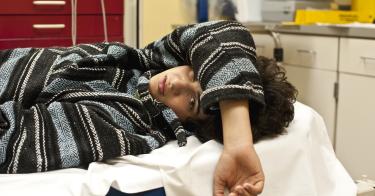In its staring contest with human biology, did the American Academy of Pediatrics just blink?
For years, the Academy has been a booster for the school-to-sterilization-pipeline for kids struggling with their sexed bodies—to the dismay of at least some of its 67,000 members.
Of course, the American Academy of Pediatrics and other partisans camouflage the harsh bits of that pipeline. They refer to everything from social transition and puberty blockers to cross sex hormones and sterilizing surgery as “gender affirming care.” Its 2018 policy statement is, in effect, a catechism for this approach.
But in a telling letter to the Wall Street Journal this week, the group seemed to signal a shift in its position. Over the last few weeks, the group has suffered some bad press and may have decided that its preferred term of art needs an update.
Bad Press Spillover
Some of the bad press has been spill over from Boston Children’s Hospital. Recently, this hospital, a pioneer in applying the methods championed by the American Academy of Pediatrics, put a series of short explainer videos on its YouTube channel.
The videos, set to soothing music, feature talking heads describing services such as breast removal and the surgical fashioning of penile and vaginal simulacra. The former requires the harvesting of skin from the forearm or thigh of the patient. The latter demands daily balloon dilation inside the “neovagina” for the rest of the patient’s life.
Note: This is a hospital for children.
The videos went viral on social media with help from activist Chris Elston, viral Twitter account Libs of Tiktok, journalist Colin Wright, and many others. Boston Children’s and its media acolytes tried to claim that the hospital didn’t really do gender surgeries on minors. That wasn’t true, as news sources such as the Daily Caller pointed out. The hospital, as The Post Millennial reported, “allowed vaginoplasties on 17-year-old males, phalloplasties on 18-year-old females, and double mastectomies for 15-year-olds.”
Thus exposed, Boston Children’s did what any self-interested business would do: It claimed it was getting death threats from haters. It also edited the text on its website. (Just little tweaks, such as changing “17” to “18” when referring to the age of eligible patients.)
And it pulled all the videos off its YouTube page.
A High Profile Shot Across the Bow
With this as background, Julia Mason and Leor Sapir published a piece in the Wall Street Journal on the American Academy of Pediatrics’ “Dubious Transgender Science,” as the headline declared. They detailed the whopping errors in a study by Jack Turban published in the Academy journal Pediatrics (and dismantled online by friends and critics in a matter of days.) Mason and Sapir noted that countries such as the United Kingdom, Sweden, and Finland have begun to have second thoughts about the “gender-affirming” protocol.
Finally, Mason and Sapir laid out the evidence that the American Academy of Pediatrics leaders have suppressed debate among its members on the scientific merits of these treatments. Instead, those leaders have published “shoddy but politically correct” research to push their party line on gender surgery.
Damage Control
This critique in the Wall Street Journal provoked a response from Academy president Moira Szilagyi. Her response makes heavy use of the all-purpose euphemism “gender affirming care.” But it includes this claim:
This is what it means to “affirm” a child or teen; it means destigmatizing gender variance and promoting a child’s self-worth. Gender-affirming care can be lifesaving. It doesn’t push medical treatments or surgery; for the vast majority of children, it recommends the opposite.
Is this a policy shift for the Academy? The Society for Evidence-Based Gender Medicine thinks so. In a tweet, the group says that the statement “realigns the AAP with Sweden, Finland and the UK’s new cautious stance.”
The Society goes on to call for the Academy to “to update its guidelines accordingly and articulate the alternative treatment paths including the role of exploratory psychotherapy.”
That would be a cause for celebration. But I suspect the American Academy of Pediatrics is just doing damage control. Rather than repenting, its leaders are trying to obscure the meaning of the phrase “gender affirming care.”
That phrase is short for the “gender affirming care model.” It is the official term used to refer to the social transition-to-surgery pathway. That’s how the Academy has deployed it. And that’s how the current Department of Health and Human Services defines it.
This model is meant to contrast with talk therapy to help kids reconcile their feelings with their bodies. Partisans of “gender-affirming care,” like the Academy, disparage this alternative as “conversion therapy.”
It makes sense that the American Academy of Pediatrics would seek to obscure the dark truth of “gender-affirming care” and imply that it has little to do with genital surgery for minors.
But even if, contrary to fact, no kids received genital surgery until their eighteenth birthday, gender-affirming care for troubled teens ends with sterility and lifelong drugs. It starts with preferred pronouns and puberty blockers. Indeed, puberty blockers, as the name implies, are given to kids who haven’t yet started puberty.
Youth who enter the mouth of the pipeline tend not to get out the other side with their genitals and fertility intact. Candice Jackson, former acting assistant secretary for civil rights at the Department of Education, summed up this point nicely: “‘Social transition’ is the gateway to ‘gender drugs & surgeries.’”
For year, the American Academy of Pediatrics has been a leading U.S. cheerleader of this medical model for teens, a model marketed and practiced by hospitals such as Boston Children’s. I fear it’s going to take far more than a few weeks of bad PR to get the Academy to change course.
This piece originally appeared in The Daily Signal




